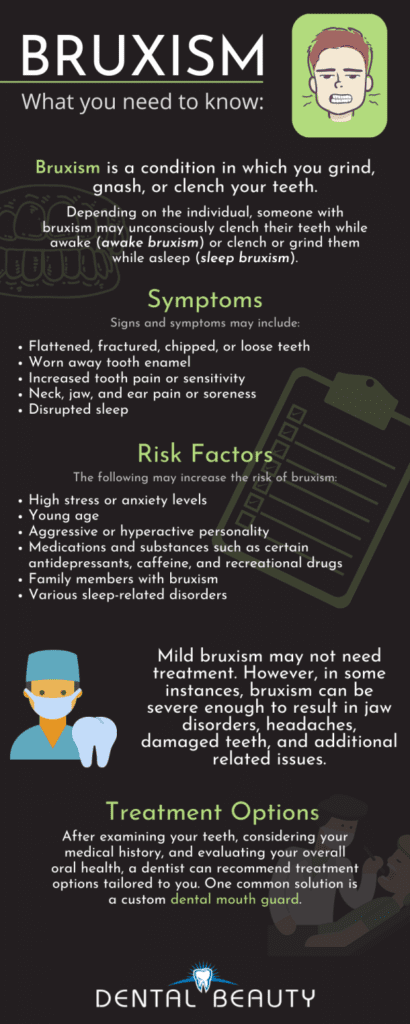Bruxism: Are You Damaging Your Teeth In Your Sleep?
Regardless of how diligently you care for your teeth throughout the day, you may be harming them overnight or in other situations without realizing it. Many individuals experience teeth grinding and jaw clenching — a condition known as bruxism — while asleep or in times of stress. Over time, these actions can result in moderate to severe dental damage, facial pain, and irregular sleep patterns if unaddressed. However, there are treatment and relief options available.

Causes and Symptoms
Teeth grinding and jaw clenching can stem from stress and anxiety. Bruxism is one of the several ways our body physically manifests stress, even if our minds remain unaware of it. The next time you find yourself combating a high-stress situation, pay close attention to what’s happening in your mouth. Are you clenching or grinding your teeth? If you’re among the 8% of Americans who experience bruxism, then you probably are.
Other risk factors for this condition include substance abuse (such as drugs, alcohol, and caffeine), sleep apnea, as well as bite and alignment issues.
One telltale sign of bruxism is frequently waking up with a sore mouth or tight jaw. You might also observe that your teeth begin to wear down in odd patterns over time. It’s important to keep in mind that changes like these may not be evident at first since many people grind their molars and back teeth, which are not very visible.
Treatment and Diagnosis
A surefire way to confirm whether you experience bruxism is to make your dentist aware of your symptoms upon your next appointment. They can review the wear patterns on your teeth and examine your jaw to determine any unusual grinding or clenching.
At that point, your dentist will likely prescribe a mouth or bite guard, which will prevent your teeth from touching while you sleep and give you something to bite into if you clench your jaw. While a bite guard may take some getting used to, your oral health — and whole head, for that matter — will thank you for it.
Getting the Help You Need
Rest assured that our dental team is well-versed in the symptoms and warning signs of bruxism and will work with you to develop a customized treatment plan based on your specific symptoms and lifestyle. For more information about dental mouth guards, contact us today!




